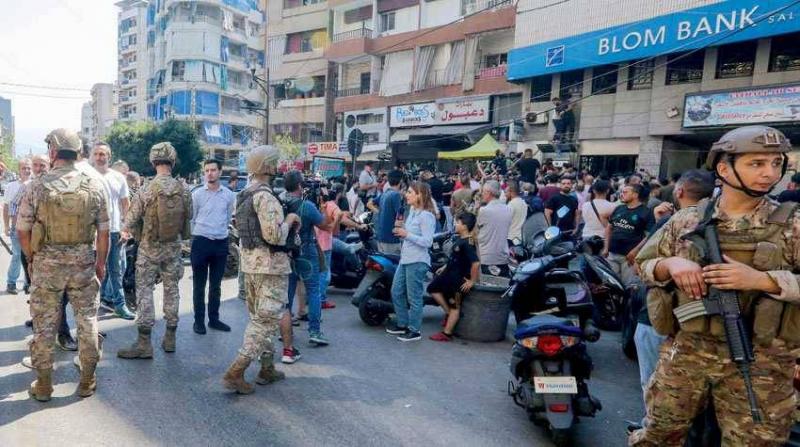There is currently no decision from the Association of Banks to reverse the closure that has just completed its first week and will enter its second week without any positive signs starting next week, reminiscent of what happened after the October 17 Revolution. Are we facing a new banking financial crisis? What forms will it take?
So far, there are no reassurances for banks from the Ministry of Interior regarding the protection of banks from the incursions they are facing, according to "Al-Joumhouria." Thus, we are facing an extension of the bank closure decision for a second week, especially amid ongoing threats that depositors are willing to shed blood inside banks to retrieve their deposits after a long wait regarding the crisis, for which no decision has been made to reassure depositors about the fate of their money.
While banks have been halted or disabled from performing their role and offering banking services since 2019, to what extent can the closure affect the lives of depositors? Will the continuation of bank closures provoke violent reactions from depositors starting next week with the upcoming payday? Will workers and employees queue up in front of ATMs to withdraw their salaries, and will the available ATM funds be sufficient for everyone, or will there be conflicts in front of banks over the priority of withdrawals?
In this context, economic expert Patrick Mardini confirmed to "Al-Joumhouria" that bank closures cannot continue indefinitely, even if a large part of the services previously provided by banks are no longer available, such as granting loans to finance the Lebanese economy (to buy an apartment, to establish a company...) and attracting deposits. Therefore, due to the crisis, Lebanese banks no longer provide loans or receive deposits. As the closure continues, nothing will change in this regard, but a significant part of daily business operations is still linked to banks, such as:
- **Import Operations to Lebanon:** Lebanese traders need to pay their suppliers in dollars through Lebanese banks (traders have fresh dollar accounts from which they pay their suppliers abroad for imported goods), and the closure has hindered their work. He noted that previously, traders dealt with suppliers directly, purchasing the goods, and then would transfer the payment abroad in installments upon receipt. However, due to the ongoing financial crisis, traders are now required to pay in advance before receiving goods, which means the bank closure disrupts any business operation.
- **Export Operations:** Export operations to abroad have also been affected by the closure, such as industrialists and agricultural producers. They need to receive payment for their exported goods to cover production costs, pay employees' salaries, or use the funds to buy raw materials. Thus, closing banks will hinder their work.
- **Receiving Money from Expats:** The ongoing bank closures impede the reception of funds sent by expats to their families, which is done through banks via special accounts. Consequently, they will face difficulties in accessing their money, especially starting next week at the end of the month when most transfers are received. Their outcry will increase sooner or later if the closures continue.
In conclusion, the continued closure of banks will disrupt businesses and citizens' interests, especially since the banking sector is one of the primary means through which fresh dollars enter the country (whether through exports or expatriates). Therefore, closing banks is effectively closing a vital artery of the economy, and the crisis must be addressed as quickly as possible.
In response to a question, Mardini expressed concern about the likelihood of queues forming at ATMs starting next week with salary withdrawals, noting that previously, depositors split between withdrawing from banks and ATMs. Thus, the available funds may not be sufficient for all employees, and latecomers may miss out on their money, potentially leading to a wave of anger among citizens and opposing reactions. He added that the longer the bank closures last, the greater the restlessness among depositors will become.
Regarding the similarities or differences between the closures on the eve of October 17, 2019, and today, Mardini stated that in both cases, the damage to the Lebanese economy is significant, and there will be an increase in the erosion of trust between banks and depositors, raising citizens' fears over their deposits and undermining confidence once again.




